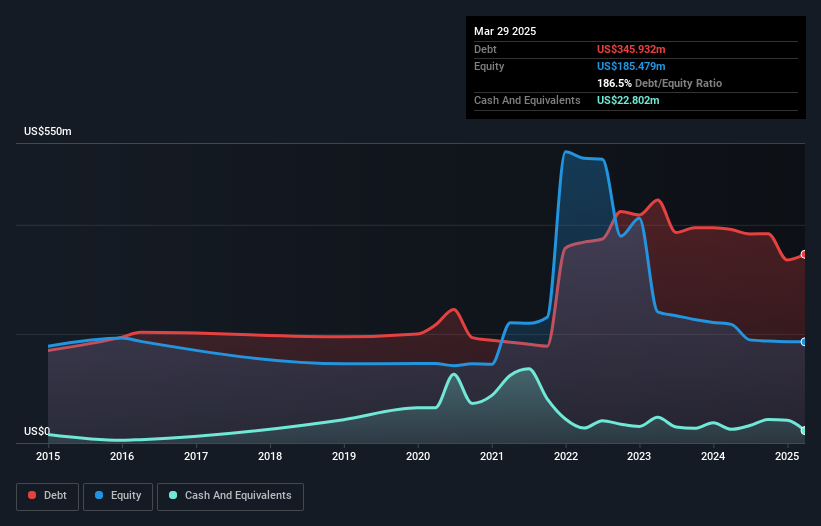The external fund manager backed by Berkshire Hathaway's Charlie Munger, Li Lu, makes no bones about it when he says 'The biggest investment risk is not the volatility of prices, but whether you will suffer a permanent loss of capital.' It's only natural to consider a company's balance sheet when you examine how risky it is, since debt is often involved when a business collapses. Importantly, Bioventus Inc. (NASDAQ:BVS) does carry debt. But the real question is whether this debt is making the company risky.
When Is Debt A Problem?
Debt and other liabilities become risky for a business when it cannot easily fulfill those obligations, either with free cash flow or by raising capital at an attractive price. If things get really bad, the lenders can take control of the business. While that is not too common, we often do see indebted companies permanently diluting shareholders because lenders force them to raise capital at a distressed price. Of course, plenty of companies use debt to fund growth, without any negative consequences. When we examine debt levels, we first consider both cash and debt levels, together.
How Much Debt Does Bioventus Carry?
You can click the graphic below for the historical numbers, but it shows that Bioventus had US$345.9m of debt in March 2025, down from US$391.2m, one year before. However, it does have US$22.8m in cash offsetting this, leading to net debt of about US$323.1m.

A Look At Bioventus' Liabilities
Zooming in on the latest balance sheet data, we can see that Bioventus had liabilities of US$174.8m due within 12 months and liabilities of US$331.2m due beyond that. On the other hand, it had cash of US$22.8m and US$118.1m worth of receivables due within a year. So its liabilities total US$365.1m more than the combination of its cash and short-term receivables.
This is a mountain of leverage relative to its market capitalization of US$465.6m. Should its lenders demand that it shore up the balance sheet, shareholders would likely face severe dilution.
Check out our latest analysis for Bioventus
We measure a company's debt load relative to its earnings power by looking at its net debt divided by its earnings before interest, tax, depreciation, and amortization (EBITDA) and by calculating how easily its earnings before interest and tax (EBIT) cover its interest expense (interest cover). This way, we consider both the absolute quantum of the debt, as well as the interest rates paid on it.
Weak interest cover of 1.1 times and a disturbingly high net debt to EBITDA ratio of 5.5 hit our confidence in Bioventus like a one-two punch to the gut. This means we'd consider it to have a heavy debt load. Looking on the bright side, Bioventus boosted its EBIT by a silky 95% in the last year. Like a mother's loving embrace of a newborn that sort of growth builds resilience, putting the company in a stronger position to manage its debt. When analysing debt levels, the balance sheet is the obvious place to start. But it is future earnings, more than anything, that will determine Bioventus's ability to maintain a healthy balance sheet going forward. So if you want to see what the professionals think, you might find this free report on analyst profit forecasts to be interesting.
Finally, a company can only pay off debt with cold hard cash, not accounting profits. So we always check how much of that EBIT is translated into free cash flow. Looking at the most recent two years, Bioventus recorded free cash flow of 44% of its EBIT, which is weaker than we'd expect. That's not great, when it comes to paying down debt.
Our View
Bioventus's interest cover and net debt to EBITDA definitely weigh on it, in our esteem. But the good news is it seems to be able to grow its EBIT with ease. It's also worth noting that Bioventus is in the Medical Equipment industry, which is often considered to be quite defensive. Looking at all the angles mentioned above, it does seem to us that Bioventus is a somewhat risky investment as a result of its debt. That's not necessarily a bad thing, since leverage can boost returns on equity, but it is something to be aware of. While Bioventus didn't make a statutory profit in the last year, its positive EBIT suggests that profitability might not be far away. Click here to see if its earnings are heading in the right direction, over the medium term.
Of course, if you're the type of investor who prefers buying stocks without the burden of debt, then don't hesitate to discover our exclusive list of net cash growth stocks, today.
Valuation is complex, but we're here to simplify it.
Discover if Bioventus might be undervalued or overvalued with our detailed analysis, featuring fair value estimates, potential risks, dividends, insider trades, and its financial condition.
Access Free AnalysisHave feedback on this article? Concerned about the content? Get in touch with us directly. Alternatively, email editorial-team (at) simplywallst.com.
This article by Simply Wall St is general in nature. We provide commentary based on historical data and analyst forecasts only using an unbiased methodology and our articles are not intended to be financial advice. It does not constitute a recommendation to buy or sell any stock, and does not take account of your objectives, or your financial situation. We aim to bring you long-term focused analysis driven by fundamental data. Note that our analysis may not factor in the latest price-sensitive company announcements or qualitative material. Simply Wall St has no position in any stocks mentioned.
About NasdaqGS:BVS
Bioventus
A medical device company, focuses on relieving pain and addressing musculoskeletal therapies in the United States and internationally.
Very undervalued with moderate growth potential.
Similar Companies
Market Insights
Community Narratives



